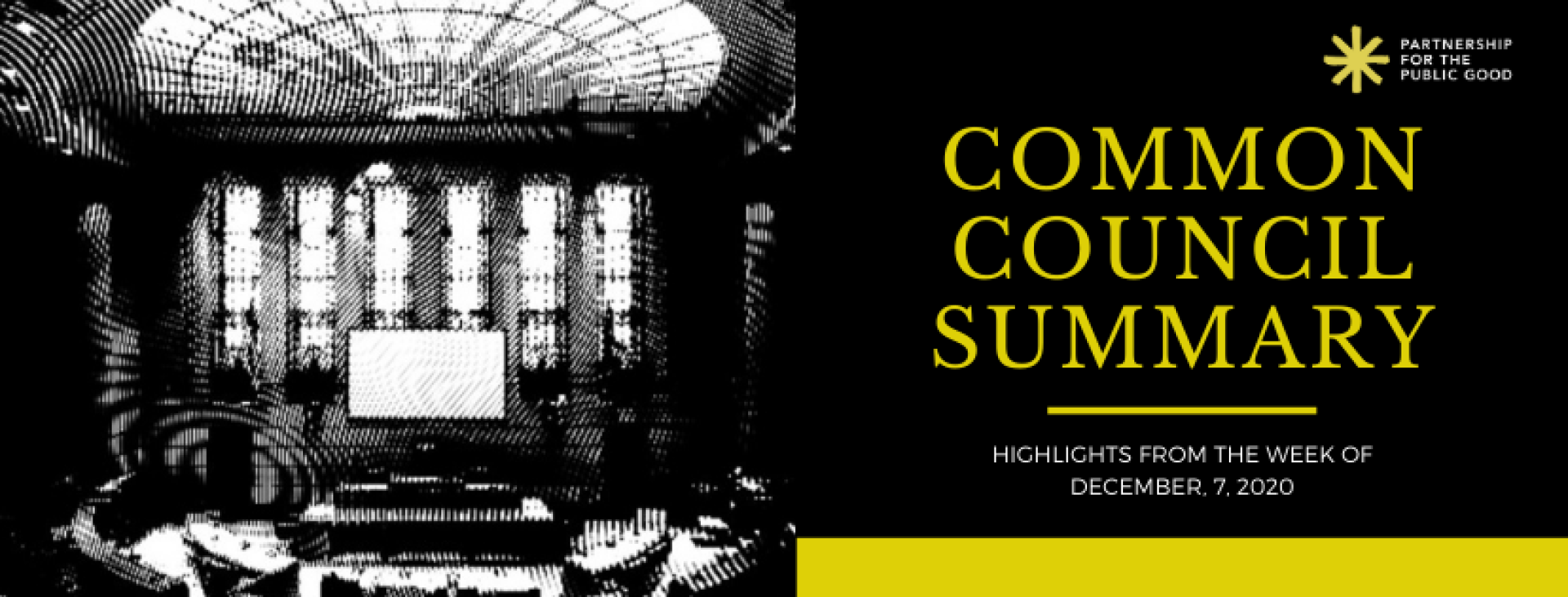News Take Action

Buffalo Common Council Summary: Week of December 7, 2020
| Date: | December 10, 2020 |
| Share: |
Each week, PPG summarizes important takeaways from the major Buffalo Common Council meetings. We also include information from Council meetings related to our Community Agenda items.
This week, the Buffalo Common Council held two sessions: A Caucus Meeting, and a Regular Meeting. A Caucus Meeting is where members from a specific political party – in Buffalo's case, the Democratic Party – meet, but official voting on issues does not occur. A Regular Meeting is the Common Council's primary meeting, where the body makes official decisions on issues.
During the Caucus Meeting, the Council received updated information from the Deputy Comptroller on the Comptroller's 2020 Comprehensive Annual Financial Report (CAFR). The comptroller held two CAFR informational sessions on December 9, at 10 a.m. and 2 p.m., for an hour each. As a note, CAFR gives the entire financial summary of the previous fiscal year (the most recent ended June 30, 2020), and tends to be an exceptionally long and challenging read. (This year's CAFR is 188 pages long.) Hence, an informational session is crucial for the average Buffalo resident to understand how the City of Buffalo spends taxpayer dollars.
CAFR is also notoriously difficult to obtain as the comptroller website blocks access to the latest CAFR without special permissions. (The comptroller and the Common Council have yet to make data from those informational sessions available to the public.) The comptroller hasn't posted an annual financing report on Facebook since March 2019, and the City of Buffalo hasn't posted a CAFR on the city website's CAFR archive since 2017.
Find the full 2020 CAFR, located between PDF pages 57 and 244, at the following link: http://buffalony.iqm2.com/Citizens/FileOpen.aspx?Type=1&ID=1961&Inline=True
Common Council also discussed an inquiry into the school zone speed camera program, and on November 17, 2020 – at 11 a.m., during a special session – the Common Council amended the school zone speed camera ordinance to reflect different hours, flashing beacon locations, and sign locations. There are five active cameras: two located in the Delaware and University Districts, and one in South District. Before the change, the traffic cameras would automatically ticket speeding residents between 7 a.m. and 6 p.m. The Council amended the ordinance to ticket between the hours of 7:30 a.m. to 9:30 a.m., and 2:30 p.m. to 4:30 p.m.
Councilmembers noted multiple issues with the validity of the automatic tickets sent to residents. Buffalo residents should receive automated tickets within 14 days of the violation, but some reported that they received tickets nearly a month later. Councilmember Wyatt noted that residents received their tickets with only seven days left to pay the ticket. Automated tickets should only issue while the flashing traffic beacons and cameras are on, yet, Buffalo residents reported receiving tickets for times when the beacons and cameras were not on. Residents also received tickets with incorrect postmarks, and a significant number of residents paid these allegedly invalid tickets out of fear of losing their driver's license. The Common Council has not stated a clear refund policy for incorrectly issued tickets. Wyatt and Golombek both commented on how the ordinance has been problematic since its inception.
During the Regular Meeting, Councilmember Scanlon discussed his concerns regarding Buffalo Public Schools (BPS) distance learning model and reopening plan. Scanlon personally believes that the BPS plan is insufficient for students to return to school and also stated concerns from parents, teachers, and administrators that "virtual learning is not working." Common Council later discussed the school speed zone issue from the Caucus meeting in further detail, restating their previous points from the meeting. Council President Pridgen announced that Common Council would pause the program if the vendor and the Department of Public Works do not fix them, and Councilmember Rivera called the program "embarrassing" and "a complete mess." Councilmember Wyatt stated a resident received three separate tickets for the same incident, which were incorrectly issued in the first place – because the flashing beacon was not on. Pridgen noted that the phone number listed on the tickets for appeals often does not work, and when it does, the vendor's telephone office does not return calls or voicemails. The Common Council instructs improperly ticketed residents to request a hearing on their ticket and call their city representative.
Need more than just a summary? Contact us at info@ppgbuffalo.org, or find full meeting information and schedules here: http://buffalony.iqm2.com/Citizens/Default.aspx
This summary was drafted by Orlando Dickson, Civic Educator at Partnership for the Public Good.